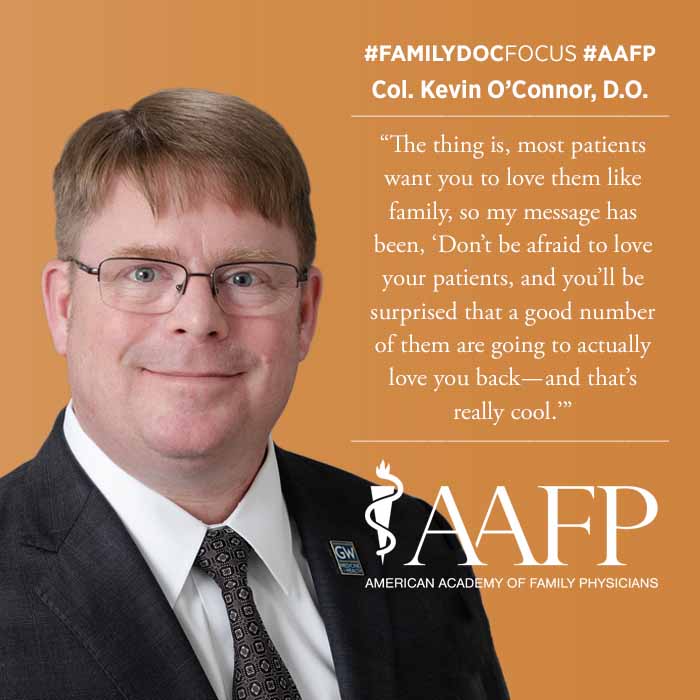FP Reflects on Service on Front Lines of Family Medicine
June 13 2019 10:29 am Jill Sederstrom – Retired Army Col. Kevin O'Connor, D.O., has always felt he had to be there to care -- whether it was jumping out of airplanes alongside members of the 82nd Airborne Division, joining his fellow soldiers on the front lines in Afghanistan to help develop better "point-of-wounding" procedures or traveling around the world beside the nation's second-in-command when he served as (then) Vice President Joe Biden's dedicated family physician.
During his 22 years in the Army -- a stint that included more than a decade serving the White House -- O'Connor was never content to sit on the sidelines.
"I didn't want to be somebody who was back writing papers about stuff I really hadn't experienced," he said. "I wanted the credibility and authenticity of being on the ground."
As O'Connor describes it, he's the Forrest Gump of military medicine, calling himself "a simple man who just found himself in extraordinary circumstances and didn't screw up." But his long list of accolades, educational achievements and prestigious job responsibilities fly in the face of that claim and instead depict a highly skilled family physician who has found himself continually searching for ways to better serve his patients, whether it's in a classroom, at a hospital or in a war zone.
During his tenure with the Army, O'Connor served as a family physician, a flight surgeon, an instructor and a hyperbaric medical officer for some of the nation's most elite units, including the 82nd Airborne Division, the 75th Ranger Regiment and a special missions unit within the United States Army Special Operations Command.
After being on the ground during countless combat rotations, O'Connor was instrumental in rethinking Department of Defense trauma procedures to develop innovative point-of-wounding strategies that addressed the unique needs of caring for wounded combatants in nonpermissive, hostile settings.
"We had to take the environment into account," O'Connor said, adding that although certain procedures worked perfectly well in hospital settings, they weren't always appropriate on the move, in the dark, while soldiers were getting shot at.
"One of our tenets is, 'In God we trust; all others must bring data,' so we actually applied science to a very unique environment," he said of his role in helping launch the Committee on Tactical Combat Casualty Care.
Then, in 2006, O'Connor was called to the White House, where he initially served as a "utility player" during the Bush administration, providing medical care wherever he was needed, until he was ultimately named "physician to the vice president." In that role, O'Connor served as family physician for Vice President Joe Biden and his family during both terms of office -- developing a unique bond with the nation's "second family."
"We went through a lot together," O'Connor said.
After President Barack Obama's second term officially came to an end in 2017, O'Connor decided to retire from military service. But he hasn't stopped finding ways to serve patients in need.
He now serves as director of executive medicine at The George Washington University and also holds the titles of medical director of international & diplomatic affairs at the university's hospital, associate professor of medicine and senior medical advisor for health sciences programs.
O'Connor said that when he reflects on his varied career as a family physician, the common theme has always been his desire to develop longitudinal relationships with the patients he serves.
"The thing is, most patients want you to love them like family, so my message has been, 'Don't be afraid to love your patients, and you'll be surprised that a good number of them are going to actually love you back -- and that's really cool,'" he said.
